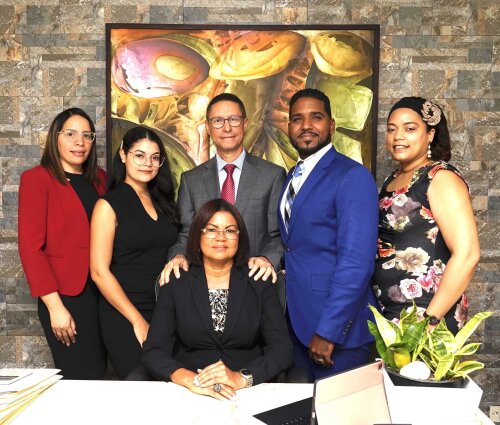Best Military Divorce Lawyers in Sosua, Cabarete
Share your needs with us, get contacted by law firms.
Free. Takes 2 min.
Free Guide to Hiring a Family Lawyer
List of the best lawyers in Sosua, Cabarete, Dominican Republic
About Military Divorce Law in Sosua, Cabarete, Dominican Republic
Military divorce in Sosua and Cabarete, located in the Puerto Plata region of the Dominican Republic, refers to the dissolution of marriage between one or both spouses who are members of the armed forces or connected to military service. These cases are unique due to the intersection of Dominican family law and, in some situations, foreign military regulations or benefits. Foreign residents, including those from the United States, Canada, or Europe, may find aspects of their divorce subject to local Dominican laws as well as applicable international treaties or military policies. Sosua and Cabarete are home to many expatriates and military families, making it essential to understand how military service can impact divorce proceedings in this jurisdiction.
Why You May Need a Lawyer
A military divorce in Sosua or Cabarete involves distinct challenges and legal complexities. You may need a lawyer if:
- You or your spouse are on active military duty, and the process must account for deployment or overseas assignments.
- There are questions concerning the distribution of military pensions, allowances, or other benefits.
- You are navigating issues related to child support, custody, or visitation rights when military service affects regular schedules.
- One or both spouses are foreign nationals and need guidance on the recognition of the Dominican divorce in other countries.
- You are concerned about legal notice, service of papers, or compliance with protections granted to military members under Dominican and international law.
- You need to ensure all documentation and procedures comply with both local and potentially foreign legal requirements.
Legal advice is crucial to protect your rights, navigate complex regulations, and achieve a fair outcome in your military divorce.
Local Laws Overview
Dominican law governs divorce proceedings in Sosua and Cabarete. There are several types of divorce, but the process is particularly nuanced for military families and foreign nationals. Key aspects include:
- Jurisdiction: At least one spouse must have a legal domicile or residence in the Dominican Republic to qualify for local divorce proceedings.
- Grounds for Divorce: Common grounds are mutual consent, incompatibility, abandonment, or adultery. Special provisions may apply for foreign spouses and military personnel stationed abroad.
- Notification and Service: Dominican courts have specific requirements for service of process, especially when one party is deployed or resides outside the country. International agreements may also play a role in the notification process.
- Division of Property: Assets and debts acquired during marriage are usually divided equally, unless there is a prenuptial agreement or foreign law to consider.
- Military Benefits: Issues such as pensions, allowances, and healthcare benefits require special attention. Dominican courts may defer to home country regulations for division of certain military benefits.
- Child Custody and Support: The best interests of the child always take priority. Military service can influence custody, visitation schedules, and support payments.
- Recognition of Foreign Divorces: Divorces finalized in the Dominican Republic may require additional steps to be recognized in a military member’s home country.
Frequently Asked Questions
What makes a military divorce different from a civilian divorce in the Dominican Republic?
Military divorces may involve added complexities like international service of process, division of foreign pensions and benefits, and considerations for deployment or relocation.
Can I get divorced in Sosua or Cabarete if only one spouse lives in the Dominican Republic?
Yes, Dominican law allows for divorce if one spouse is domiciled or resident in the country. Proper legal procedures must be followed regarding notification and documentation.
How are military pensions divided in a Dominican divorce?
Military pensions and benefits may be subject to division according to the home country’s laws, but the Dominican court will often require documentation and may facilitate division in line with international agreements.
Does being on active duty or deployed affect the divorce process?
Yes, active duty or deployment can impact timelines, notification requirements, and hearings. Courts may delay proceedings or provide special accommodations to protect the rights of the deployed spouse.
Will my divorce in the Dominican Republic be recognized by the military or my home country?
Recognition depends on the rules of your home country and the military branch. Many countries and military systems recognize Dominican divorces if procedures are properly followed and all parties have been adequately notified.
How is child custody handled when one parent is in the military?
Child custody decisions are always based on the best interests of the child. Military service may affect the practical arrangements for custody, visitation, and child support.
What documents will I need for a military divorce in Sosua, Cabarete?
Common requirements include marriage certificates, proof of identity, residence documentation, military records, and documentation of assets or benefits.
What if my spouse does not agree to the divorce?
The Dominican legal system allows for contested divorces. The process may be longer and more involved, but it can proceed without mutual consent under certain grounds.
Can I handle a Dominican military divorce entirely remotely if I am stationed abroad?
It is possible to handle much of the process remotely through legal representation, but certain steps, such as court appearances or notary signings, may require travel or special arrangements.
What languages are legal proceedings conducted in?
All legal proceedings are conducted in Spanish. Certified translations will be necessary for foreign documents, and it is advisable to work with a bilingual attorney.
Additional Resources
- Dominican Republic Ministry of Justice: Resource for official requirements and documentation regarding divorce.
- Local Family Courts (Tribunal de Familia): The court that handles divorce, child custody, and property division.
- Military Family Support Services: Many foreign embassies and military bases provide family legal assistance and counseling.
- Dominican Bar Association (Colegio de Abogados): Provides referrals for qualified lawyers in Sosua and Cabarete.
- Local Translation Services: Accredited translators are essential for document processing and legal compliance.
- Foreign Embassies: Your embassy or consulate can advise on the recognition of Dominican court decisions and provide notarial services.
Next Steps
If you believe you need assistance with a military divorce in Sosua or Cabarete, Dominican Republic, consider the following steps:
- Gather all relevant documents, including proof of marriage, residency, military status, and financial information.
- Consult with a qualified attorney who has experience in both Dominican family law and international military divorce matters.
- If needed, contact your embassy or military legal office for guidance on compliance with foreign laws and procedures.
- Engage accredited translation and notary services if your documents are not already in Spanish or require official certification.
- Be proactive in discussing your goals and concerns regarding issues like child custody, asset division, and pension rights.
- Ensure you understand the timelines, costs, and possible outcomes before commencing the legal process.
Legal issues involving military service and international jurisdictions can be complex, but with proper guidance, you can navigate your military divorce effectively and protect your interests.
Lawzana helps you find the best lawyers and law firms in Sosua, Cabarete through a curated and pre-screened list of qualified legal professionals. Our platform offers rankings and detailed profiles of attorneys and law firms, allowing you to compare based on practice areas, including Military Divorce, experience, and client feedback.
Each profile includes a description of the firm's areas of practice, client reviews, team members and partners, year of establishment, spoken languages, office locations, contact information, social media presence, and any published articles or resources. Most firms on our platform speak English and are experienced in both local and international legal matters.
Get a quote from top-rated law firms in Sosua, Cabarete, Dominican Republic — quickly, securely, and without unnecessary hassle.
Disclaimer:
The information provided on this page is for general informational purposes only and does not constitute legal advice. While we strive to ensure the accuracy and relevance of the content, legal information may change over time, and interpretations of the law can vary. You should always consult with a qualified legal professional for advice specific to your situation.
We disclaim all liability for actions taken or not taken based on the content of this page. If you believe any information is incorrect or outdated, please contact us, and we will review and update it where appropriate.










